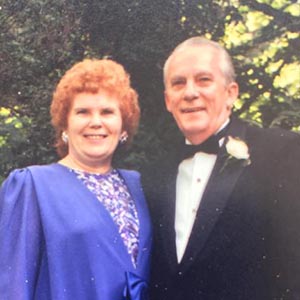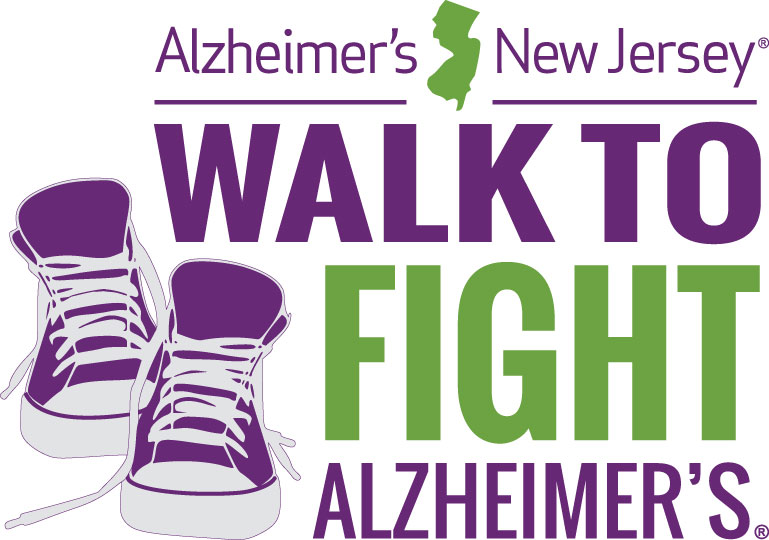Susan Hughes (caregiver)

My father, who died in 2009, was an extraordinary gentleman, a kind and caring soul who was never flustered by any challenge that life presented. A few years before his death, he was diagnosed with Alzheimer’s and towards the end of his life had difficulty with even the simplest tasks forgetting so much that many of us take for granted. Through it all, however, he maintained the same dignity and grace that he always had. Despite the devastating effect of the disease, our experience with Alzheimer’s was a little different than many other families. We were blessed to have as a primary caregiver my stepmother, who gently shepherded my Dad through the last years of his life. Only in the last few months was he confined to a nursing home because his care had reached a level that couldn’t be handled at home.
Throughout my Dad’s illness, my brother and step-siblings were wonderfully supportive, and while we saw many others who were frustrated and struggled against what was happening, my Dad never lost his calmness of spirit, even when confronted with not knowing members of his own family or confusing us with others. This is particularly difficult for the younger members of the family, who are watching their grandparents experiencing the loss of faculties and mental awareness, are also in a difficult position. For many of them, they have just reached a stage of life where they are trying to make sense of the world around them. Trying to determine where the loved one’s mind is at any given time, and trying to become a part of that reality, is one of the greatest challenges to face. There were times during the struggle when my Dad didn’t even realize that he was married to my stepmother, even though they were married for more than 23 years, and he thought that he was still married to my mother, who had died years earlier than his remarriage. Yet, my stepmother carried on, with the support of family and friends, without ever complaining. During this same period, my brother was a rock for both my father and stepmother, as well as for myself, and never wavered in his support, physical and emotional. My sister-in-law too, had to be a tower of strength for my brother and for our whole family. My step-siblings and their spouses were extraordinary, and were present, physically and emotionally, through the bright and dark moments, for both my Dad and stepmother. While Alzheimer’s can test family relationships, we were blessed to have the bonds of family strengthened during the course of the illness.
A few years later, ironically, my stepmother was also afflicted with a form of dementia, which resulted in her confinement in a nursing home in a non-communicative state. During that period, her own daughters showed the same strength of spirit and stepped up to become caregivers, not only for their Mom, but for a younger sister, who had developmental difficulties, all while caring for their own families. Even though it’s a labor of love, caregiving is an enormously burdensome task, and takes a toll on body and soul. Caregiving, whether primary or more indirect, presents an additional challenge for those family members who have their own children. Those who are “sandwiched” between the older family members who are afflicted and their children, who need their guidance and protection, have to make difficult decisions as to how to balance their time and how to explain the circumstances to their children. In my own family, the children, my nephews and nieces, both blood and step, handled the situation with a maturity that is rarely seen in those who haven’t seen much of the areas of life over which we have such little control. In many situations, however, the children have the additional challenge of watching their older relatives, whom they remember as towers of strength, experiencing a new and developing weakness. Definitely not an easy thing to understand, even for those with more life experience.
In our own family, we recognize that we were fortunate that, during these periods of struggle, for both Dad and Tina, our burdens were light and our blessings were many. The faith of our family also played a large part in that. Given the choice, however, despite the many blessings, we would have opted to forgo these experiences, and have our loved ones’ minds and bodies intact for many long years. Each year, when I see the many wonderful people at the Alzheimer’s walk and the supportive friends and families, I have to say a special prayer for them, that they will be blessed as we have been, and that they will be further blessed with a cure or more advanced treatment during their loved one’s lifetime. Despite the advances in the care and support networks, thanks to organizations such as Alzheimer’s New Jersey, there’s still a few mountains to climb with respect to this disease.
– Susan Hughes

